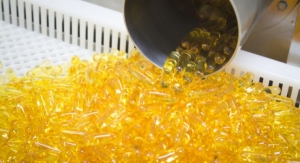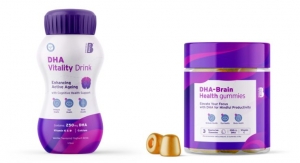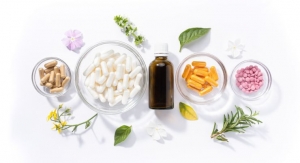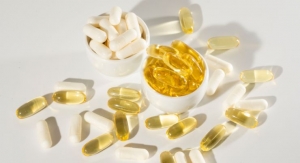By Lisa Olivo, Associate Editor10.02.17
Omega-3 supplements are a leading category within the nutraceutical industry, thanks to ingredients derived from a diverse and growing range of sources—from marine life to plants, seeds, and more.
While sales in recent years have slowed, industry experts seem optimistic that a recent influx of clinical research validating these ingredients will continue to propel the market.
As manufacturers look for innovative, effective, and convenient ways to incorporate omega-3 eicosapentaenoic acid (EPA) and docosahexaenoic acid (DHA) oils in supplements, foods, drinks, and more, consumers will be offered a variety of entry points to this dynamic marketplace.
Furthermore, commitment to sustainable and eco-friendly harvesting and cultivation of omega-3 ingredients is essential for the long-term survival of the category, while also appealing to earth-conscious consumers.
Market Analysis
Sales of omega-3 supplements have been somewhat stagnant in the past few years, according to Packaged Facts, Rockville, MD. While the category has maintained its standing in the U.S., the research firm observed a broader trend of interest and sales for omega-3 EPA and DHA oils shifting to Asian markets. Citing data from the Global Organization for EPA and DHA Omega-3s (GOED), Packaged Facts estimated the global market for finished omega-3 products was at $31.4 billion in 2015. Meanwhile, Asia earned double-digit sales growth as North American and European sales remained flat. This pattern is likely to continue in North America through 2017.
During 2015, the U.S. market was able to hold off a decline in sales, earning approximately $1.06 billion, up just 1.1% from 2014. Both GOED and Packaged Facts said they do not anticipate huge gains for the category in the short term, with sales in 2016 reaching an estimated $1.07 billion, (+1.3%), and the forecast for 2017 looking very similar. Looking ahead to 2020, minimal growth is anticipated, with a forecast CAGR of 1.8% to $1.15 billion (2016-2020).
SPINS data for the 52 weeks ending Aug. 13, 2017 found that omega-3 supplements containing fish oil concentrate were the top earners in the category, taking in nearly $302 million in the U.S., which was down slightly by 4.2% from the previous year. The next highest earning source of omega-3s was krill oil, accounting for about $74.5 million, which also dropped by 7.4% from 2016. Flax seed and/or oil took in about $46 million (-10.7% from 2016); combination oils (supplements) over $22.7 million (-2.6%); DHA products approximately $21 million (+5.6%); hemp products earned over $8 million (-6.1%); chia seed or oil earned nearly $7.5 million (-16.2%); black seed (cumin) earned about $3.9 million, (up a whopping 224%); algae-other earned around $3.5 million (+57.8%); and sea buckthorn took in $807,872 (-22.9%).
Key Benefits
Anne Healy, senior marketing manager for DSM Nutritional Products, Parsippany, NJ, discussed the importance of long-chain omega-3s fatty acids EPA and DHA. “Since we produce very limited amounts of EPA and DHA from precursor omega-3 fatty acids in our body, we need to ingest EPA and DHA in order to realize important health benefits.”
Both EPA and DHA are found in fatty fish, but Ms. Healy noted the most concentrated forms are present in fish and algal oils. “DHA is integral to the structure and function of the brain and eye. EPA is the primary fatty acid involved in cardiovascular health. Many physicians prescribe omega-3 fatty acids for a variety of conditions, including prescription EPA at a dose up to 4 grams daily to treat severe hypertriglyceridemia (Siscovick et al. Circulation, 2017).”
CEO of the Lafayette, LA-based company, the Wright Group, Sam Wright IV, referred to fish oil and algal long-chain omega-3s as “Swiss Army” ingredients, as a result of their myriad uses for protecting human health. “Heart health, inflammation control, mental acuity, and joint health tend to be the top-of-mind associations connected with omega-3s,” he explained. “All are connected to anti-inflammatory properties inherent in the molecules. Within these broad categories are benefits for all ages and both genders, from prevention of preterm births and brain/visual development in infants to possible prevention of Alzheimer’s Disease, Parkinson’s Disease, rheumatoid arthritis, and other chronic conditions of aging.”
Indicating potential benefits for “cardiovascular disease, mental health and psychiatric disorders, cancer, arthritis and inflammatory disease, eye disease, cognitive function, stress, pregnancy and healthy child development, immune function, sore joints and circulatory problems,” Mary Ann Siciliano, national sales manager, Arista Industries, Inc., Wilton, CT, said the applications for omega-3s are plentiful and meaningful to overall health.
Discussing omega-3 fatty acids’ multiple mechanisms of action, Ms. Healy cited research supporting anti-inflammatory activity for both EPA and DHA (Biochimica et Biophysica Acta (BBA) - Molecular and Cell Biology of Lipids, 2015). “EPA and DHA both help to inhibit the formation of inflammatory cytokines that may increase sensitivity to pain, and constrict blood vessels and airways. In addition to inhibiting pro-inflammatory molecules, EPA and DHA are also converted into anti-inflammatory molecules that may help to decrease sensitivity to pain, and decrease vascular permeability and mucous production. These compounds promote blood vessel integrity, which aids in reducing blood pressure and heart rate, as well as promoting a better risk profile for lipoprotein distributions, as this underlies some of their cardiovascular system benefits (Journal of Cardiology, 2014; American Journal of Hypertension, 2014).”
She added that both EPA and DHA are “precursors to bioactive metabolites called resolvins and protectins that ... help resolve inflammation as well as other pathological challenges to the immune system or nervous system (Biochimica et Biophysica Acta (BBA) - Molecular and Cell Biology of Lipids, 2015).” Ms. Healy noted that DHA in particular is incorporated into cell membrane phospholipids where it increases the motional state of the molecules and thereby alters protein functions. “This can facilitate receptor activation, transport of molecules across the membrane and enzyme functions (Huber et al. Journal of the American Chemical Society, 2002).” With new modes of action and functional benefits being discovered all the time, Ms. Healy said the list of benefits from EPA and DHA is growing.
Research Trends
Packaged Facts sees emerging research, particularly in the last two years or so, as a key factor working in favor of omega-3 supplements. Studies touting the health benefits of EPA and DHA, along with the fact that most Americans are deficient in them, has piqued consumer interest in these products. In its report, “Nutritional Supplements in the U.S., 7th Edition,” Packaged Facts stated, “Data from the National Health and Nutrition Examination Survey (NHANES) shows most adults are not consuming the recommended amount of EPA and DHA in their diets, with 80% having long-chain omega-3 polyunsaturated fatty acid concentrations below dietary guidelines for heart health. Companies such as ingredient supplier DSM and industry groups such as GOED are working to make the public more aware of this information, hoping to spur a shift in the market similar to what vitamin D supplements have experienced in recent years as knowledge of the high levels of the population deficient in the vitamin became more widespread.”
While supplement and ingredient companies look to publicize the benefits of omega-3s, researchers continue to fuel the industry with science validating their consumption. “There has never been a more studied, more credible ingredient in the health and wellness marketplace,” commented the Wright Group’s Mr. Wright. He pointed to a vast body of human clinical trials in 2016; numerous published papers, along with a monograph created by the Council for Responsible Nutrition (CRN) and GOED; a qualified health claim allowed by FDA; and RDIs established in many countries; as additional evidence backing the quality and efficacy of omega-3 supplements.
“In 2016, 231 randomized controlled trials (RCTs) were published on omega-3s, making 2016 the most prolific year for omega-3 studies in history,” observed DSM’s Ms. Healy. “In 85% of these trials, the authors concluded that omega-3s were beneficial. Through March 2017, there are over 33,000 citations found in PubMed for omega-3s (EPA and DHA).”
A recent trial displaying the benefits of omega-3s was published in the Journal of Clinical Lipidology (Maki et al. 2017), which found that supplementation was associated with a modest reduction in cardiac death. The study selected 14 randomized, controlled trials for primary analysis (71,899 subjects), with the omega-3 arm reporting 1,613 cardiac deaths (4.48% of subjects), compared with 1,746 cardiac deaths in control groups (4.87% of subjects). Researchers concluded there was an 8% lower risk of cardiac death in the omega-3 treatment arm compared to the control group. “The effects were greater in subsets with EPA+DHA doses above 1 gram/day and where individuals had more risk factors such as elevated triglyceride levels and LDL cholesterol,” stated Ms. Healy.
An additional meta-analysis published in January 2017 in Mayo Clinic Proceedings provided a comprehensive analysis to estimate the effect of EPA and DHA on coronary heart disease (CHD), evaluating the association between intake and risk (Alexander et al). “The meta-analysis used data from 18 RCTs (93,000 subjects) and 17 prospective cohort studies (732,000), and is to date, the most comprehensive quantitative analysis of its kind within the peer reviewed biomedical literature,” explained Ms. Healy. “They found a significant 18% risk reduction of CHD in the prospective cohort studies. In the sub-group analysis of the RCTs in higher risk populations, they found a reduced CHD risk by 16% in people with elevated blood levels of triglycerides (>150 mg/dL) and a reduced CHD risk by 14% in people with elevated LDL-cholesterol (>130 mg/dL).”
Also, in January 2017, Ms. Healy pointed to new data shared from the Women’s Health Initiative Memory Study, which found higher EPA and DHA levels in red blood cells were linked to lower mortality rates. The study enrolled 6,501 women aged 65-80 in 1996 (Harris et al. Journal of Clinical Lipidology, 2017). Red blood cell (RBC) EPA and DHA levels were measured at baseline and expressed by their sum (the Omega-3 Index). “After a median of 14.9 years of follow-up, 1,851 (28.5%) women had died. Red blood cell levels of EPA and DHA were higher in survivors and an omega-3 index >8% was associated with a 31% lower risk for death over 14 years.”
Indicating benefits for a younger demographic, data from seven RCTs comparing omega-3 supplementation with controls among more than 500 children and young adolescents with attention deficit hyperactivity disorder (ADHD) found that that omega-3 supplementation improved ADHD clinical symptom scores (Chang et al. Neuropsychopharmacology, 2017). Discussing the study, Ms. Healy explained, “Children and adolescents with ADHD had lower DHA and EPA concentrations. This study emphasizes the important role of DHA in maintaining brain structure and function.”
Mr. Wright suggested that some of the more exciting recent science has been around chronic diseases of aging and brain health. A recent study at Louisiana State University pointed to DHA as a precursor to NDP-1 (neuroprotection D-1), which may have implications for Alzheimer’s, Parkinson’s, stroke, and age-related macular degeneration, he explained. “In all developed societies with rapidly aging populations, it has become an economic necessity to focus on issues around prevention and not just treatment. Omega-3s are all about prevention.”
He added, “The U.S. Army is considering increasing omega-3s in garrison rations as what they are calling ‘nutritional armor’ against post-traumatic stress disorder, depression, and as a possible treatment adjunct in traumatic brain injury. The National Football League (and every other college and high school coach in America) may also one day look at this science in relation to prevention and treatment of repetitive head injury.”
Category Innovation
Industry experts indicated several areas of interest to watch in the omega-3 category, focusing on formulation trends and key ingredients.
“Vegetable omega-3s, algae sources, and other marine sources like krill and shrimp oil are being explored, as opposed to standard fish oils,” observed Ms. Siciliano of Arista Industries. She added that food and beverage fortification with omega-3 vegetable oils and oil powders is gradually becoming more common, with manufacturers in the space exploring possible opportunities.
Katrin Berntsen, director of communication for Aker BioMarine, Olso, Norway, said innovation in the omega-3 market is alive and well. As far as trends, Ms. Berntsen pointed to data from GOED that indicated the U.S. market is changing, and “moving away from refined 18:12 oils and into concentrates and others.” In response, Aker BioMarine launched its first krill oil concentrate last year called Superba Boost. “Superba Boost contains higher amounts of phospholipids, choline, and omega-3s. In fact, two capsules of Superba Boost krill oil will cover most of the daily recommended intake of the essential omega-3 fatty acids EPA and DHA.”
DSM’s Ms. Healy said omega-3 DHA fortification in dairy products is growing. “By giving consumers credible alternatives to dietary supplements, the nutritional benefits of omega-3s can be enjoyed by entire families and broader populations, and we believe this is an important outcome and an important mission,” she said. Ms. Healy also noted the popularity of supplement alternatives such as gummies and confectionery nutraceuticals gaining popularity in North America, and are continuing to emerge in other markets.
While Mr. Wright suggested the market for omega-3s in the U.S. is primarily dominated by softgel supplement capsules, he observed fortification of EPA and DHA in various products such as yogurts, spreads, milk, and baked goods. “There has been a tendency to push the envelope in the past regarding which consumer products are logical vectors for omega-3 consumption. As the market has matured it has gotten more reasonable in this regard.”
Competition with Big Pharma
Recently, Amarin Pharma filed a complaint with the U.S. International Trade Commission (ITC) requesting that it investigate “the unlawful importation or sale in the United States of synthetically produced omega-3 products that are predominantly comprised of EPA in either ethyl ester (‘EE’) or re-esterified (‘rTG’) form.” The company suggested these products are falsely labeled as dietary supplements, and are unapproved new drugs under the Federal Food, Drug, and Cosmetic Act (FDCA).
While fish oil makes up the majority of omega-3 supplements in the U.S., GOED estimated that “ethyl esters represented 12% of the U.S. dietary supplement market in 2013.” Amarin said it is not requesting investigation into standard, natural fish oil supplements, nor is it requesting investigation into synthetically produced omega-3 products in EE or rTG form that are not predominantly comprised of EPA.
Duffy MacKay, ND, senior vice president, scientific and regulatory affairs for the Council for Responsible Nutrition (CRN), countered that EPA in EE and rTG forms are ingredients that have been around for a very long time, and they have long been considered a beneficial dietary supplement to raise the level of fatty acids in the body. He opined that this complaint from Amarin Pharma, “is largely a competitive move on behalf of the drug company, which has been approved for this very narrow therapeutic treatment of high triglycerides. They spent all this money on research and FDA has granted them this ability to make the claim for the treatment of very high triglycerides, and so they turn around and they see this entire marketplace selling as supplements, and they feel like it’s their strategy to keep out the competition.”
However, Dr. MacKay said if a company wants to take a dietary ingredient through the drug approval process in order to make FDA-approved health claims, it can do so. “That’s their prerogative; they can absolutely do that,” said Dr. MacKay, “just like Lovaza [a pharmaceutical lipid-regulating product that contains 900 mg of ethyl esters of omega-3 fatty acids from fish oil] already has. But it’s not their prerogative to turn around and then say, ‘We’ve achieved approval; none of you guys can sell your products as dietary supplements anymore.’”
Amarin’s claim that EPA in EE or rTG form are unapproved new drugs is “inherently incorrect,” Dr. MacKay claimed, “because FDA determines something is a drug by its intended use. So if I have regular old fish oil and I say it’s for treating very high triglycerides or hypertension, that’s when it becomes an unapproved drug. Not just because it is in the ethyl ester form, and not just because it is concentrated. That’s not what FDA uses to determine what’s a drug. And this circles back to the fact that all of this is in FDA’s jurisdiction, and the questions of whether this is a drug or dietary ingredient should be answered by FDA; and it makes no sense why this complaint is in front of the International Trade Commission. This is within FDA’s scope.”
He concluded, “These concentrated ethyl ester products, both high EPA and high DHA, have been in the supplement industry for decades. FDA has shown no safety concerns. These are staple products. And if there’s a competitive issue, I would think it’s related to patents. But this notion that it’s an unapproved drug is just completely false.”
In response to Amarin’s complaint, CRN has submitted two separate filings to ITC: the first arguing that Amarin’s requested prohibition on the importation or sale of concentrated omega-3 supplements runs counter to public interest; and the second urging the ITC to reject the complaint because it essentially asks the ITC to second-guess how the Food, Drug and Cosmetic Act (FDCA) would answer the question of these products’ legal status. CRN is working in consultation with the law firm Adduci, Mastriani & Schaumberg, LLP, specialists in international trade law.
In addition, GOED has filed a public interest statement with the ITC, in coordination with CRN and stakeholders. In its statement, GOED asserted that limiting access to these EPA products undermines the Dietary Supplement Health and Education Act (DSHEA) of 1994 by limiting consumer access to safe and effective dietary supplements.
As lawful dietary supplements, concentrated omega-3 products are easily accessible to consumers at a variety of venues, including grocery stores, 24 hour pharmacies, and even online, GOED stated. “If these Concentrated Omega-3 Products were removed from the dietary supplement stream of commerce, as Amarin requests, the only channel of access would be through a doctor,” the statement noted. “Obtaining and filling a prescription taxes the consumer with a significant amount of time and resources expended, including making a doctor’s appointment, ensuring insurance coverage for the doctor visit, shuffling work and other schedules to attend the appointment, likely waiting a notable amount of time to meet with the doctor, determining insurance coverage for the prescription and visiting the pharmacy to pick up the prescription. As such, the time invested in obtaining a drug via prescription greatly exceeds the availability and time required to obtain a dietary supplement.” Ultimately, GOED stressed that, “The Requested Orders outcome is in direct conflict with the spirit of DSHEA, whose purpose is to ensure access to dietary supplements.”
The cost associated with a prescription product is also an unnecessary barrier to consumers, according to GOED. “The Requested Orders will also dissuade consumers from purchasing the Omega-3 Products because they will likely increase the financial cost to obtain them. Amarin acknowledges that the typical monthly cost of obtaining their product Vascepa is $200.”
GOED further underscored the fact that Amarin does not (and likely cannot) allege any health or safety concerns as the cause of its complaint. “Instead, the ‘public’ detriment alleged seems to only to be the protection of Amarin’s own financial interests. The easy access to healthful dietary supplements for reasonable costs outweighs Amarin’s profit-motivated Requested Orders.”
Sensory Issues
A well-known hurdle for formulation and consumer compliance in the omega-3 space is taste and smell. However, producers in the category have developed innovative ways to circumvent this tricky issue.
“Taste and smell have always been a concern with omega-3 fish oils,” said Ms. Siciliano, “but it is important that finished products are refined, deodorized and winterized, and properly processed to meet or exceed industry standards for quality and consistency.” She added that Arista also offers an omega-3 oil powder, which has slightly less odor than the oil, and also enables inclusion in dairy, bakery, and food products. “Soft gels seem to be the most popular way to take omega-3s as a supplement, but there have also been enteric coated capsules, which help eliminate the fishy aftertaste as well as flavored oil packets.”
Aker BioMarine has worked to overcome the sensory issues that come with krill oil. Last year the company introduced Superba 2, which features enhanced encapsulation properties as well as improved smell, taste, and visual appearance. “This product was made possible using Flexitech, our patented technology that enables us to expand our product line and bring ongoing innovation to the krill oil market,” explained Ms. Berntsen. “Thanks to Flexitech we can efficiently purify and concentrate krill oil’s various beneficial components, such as phospholipids and omega-3s and remove salts from krill oil, resulting in a product with greatly improved smell and taste.”
Steve Dillingham, global director, AlaskOmega Ingredients, Organic Technologies, Coshocton, OH, commented, “Good tasting omega-3 products are paramount to continued consumer acceptance.” AlaskOmega, he said, assures the excellent sensory qualities of its oils by setting demanding limits on the overall total oxidation (TOTOX) of all its omega-3 concentrates to a maximum of 5, more than a 5-fold reduction from the GOED industry standard of 26. “AlaskOmega TOTOX values fall typically between 1 and 3, assuring very low oil oxidation and the associated off-notes typically responsible for fishy taste and smell. To assure AlaskOmega oils have optimal taste and smell, AlaskOmega also analyzes the sensory profile of all its TG oils through a certified in-house organoleptic panel, selling only those oils that meet our quality standards.”
Omega-3s are very reactive molecules subject to oxidation and rancidity if not handled properly. Their marine or algal origins also present challenges from a taste and odor standpoint. The key to avoiding issues of taste, odor, oxidation, and rancidity is to start out with a high quality, refined raw material, according to Mr. Wright. “This is about 80% of the battle.” The Wright Group offers a line of SuperCoat microencapsulated fish oil powders suitable for inclusion in bakery, processed foods, and some beverage products such as shakes and other products containing proteins and fats which help mask unpleasant flavor notes. “The products contain both EPA and DHA in whichever ratio is needed. Other suppliers have similar products and some also have microemulsions or nanoscale products suitable for inclusion into clear beverages and even bottled waters (Omegawater in the U.K.).”
Capsugel, Morristown, NJ, now a Lonza company, has created unique hard capsule technologies that address a variety of delivery challenges faced with omegas, including combination of incompatible ingredients, odor, viscosity, and compromised ingredient stability due to sensitivity to moisture, oxidation, acidic environment, and wide working temperature ranges. According to Stan Glab, manager of product development and formulations for Capsugel, these solutions can improve the consumer experience, and by extension consumer usage.
“Many marine oils are delivered in softgels—either gelatin or vegetarian,” explained Mr. Glab. “But there are downsides to softgels. They contain plasticizers that create micro-channels in gelatin that allows oxygen to enter, pungent odors to seep out, odd tastes to jolt the palate, and the potential for ingredient migration into the shell. Oxidation can compromise the integrity of the ingredient. Antioxidants can be added, but not everyone wants to take added ingredients or can tolerate flavorings or perfumes to manage the smells in the bottle.”
To help address “burp back” and bad taste, the company offers DRcaps for Liquids, which can be used to protect integrity of ingredients from moisture and an acidic environment. “DRcaps for Liquids is a hydroxypropyl methylcellulose (HPMC) capsule that protects ingredients from stomach acids without the use of enteric coatings.” The vegetarian capsule has acid-resistant polymer properties so the capsule won’t disintegrate in the stomach, but opens immediately once the pH rises above 6.8—out of the acidic environment of the stomach and at or near the entry into the intestines. “Because the capsule is made of low-moisture HPMC, it also can help shield ingredients from destabilizing moisture in the package before ingestion and protect from acid after ingestion,” he clarified. It is also vegetarian, vegan, Halal, and Kosher.
To protect against unpleasant odors in the bottle, Capsugel offers: Licaps hard capsules, which are filled with nitrogen during manufacturing and the encapsulation process to keep oxygen out; Licaps OceanCaps fish gelatin capsule, which provides manufacturers with the ability to offer an all-marine product when used for marine and krill oils; the vegetarian Licaps Vcaps Plus; and Plantcaps for Liquids, a vegetarian pullulan capsule, naturally fermented from tapioca, which the company claims has the highest odor barrier properties of all polymers—better than gelatin or HPMC capsules.
“Licaps capsules are ideal for delivery of marine and krill oils because they promote ingredient stability due to the capsule technology’s exceptional protection against oxidation that can degrade the integrity and efficacy of an ingredient,” said Mr. Glab.
He added that the Licaps technology is especially effective in protecting the more highly concentrated oils. “When encapsulating a high concentrate versus a typical 18:12 formula, marketers need to consider stability of a high concentrate omega-3. The higher the concentration, the more physically unstable it becomes, making it more prone to degradation, especially oxidation.”
Another tactic used to combat oxidation and unpleasant odor is combining marine oils with antioxidants. “Marine oils are often paired with carotenoids, and like phospholipids can be highly unstable when exposed to oxygen,” noted Mr. Glab. “Products in this category include astaxathin, zeaxanthin, beta-carotene, lutein, and lycopene. Because carotenoids are also an unstable phytochemical, the liquid form is best delivered in a hard capsule with technology like Licaps. Pairing krill oil and carotenoids offers customers a powerful combination antioxidant and heart healthy supplement in a delivery form that optimizes stability without unpleasant odors and tastes or added flavorings, antioxidants, or perfumes.”
Focus on Sustainability
To protect and ensure the long-term viability of the marine omega-3 market for years to come, the issue of responsible production and harvesting practices has been gaining attention.
“Consumers are becoming much more aware of sustainability in the seafood sector, and are demanding that their seafood products be from sustainable sources,” commented Mr. Dillingham of AlaskOmega Ingredients. Additionally, he asserted that more omega-3 supplement manufacturers and retailers are getting in on the sustainability wave as well.
“Supply source/value chain certification schemes such as the Marine Stewardship Council’s Chain of Custody program help to build awareness and promote sustainability to the consumer via sanctioned use of the MSC logo, which allows MSC-certified supplement manufacturers to promote their commitment to sustainability sourcing by displaying the MSC logo on their product labels.”
These certification programs enable consumers who value sustainable practices to become patrons of products that promote their values. The manufacturers, meanwhile, can display a trusted sustainability certification logo, allowing them to differentiate themselves from other products on store shelves. Mr. Dillingham believes, “Consumer’s interest in certified sustainably sourced products will only increase in the future, driving supplement manufacturers to continue to improve their overall sustainability position.”
Ms. Berntsen of Aker said sustainability is imperative to finding success in the omega-3 category. “It’s becoming the standard with more and more consumers globally. In fact, according to 2016 data from the Natural Marketing Institute, supplement users are looking more closely at where ingredients are sourced from, showing strong preference for natural, organic, and sustainable sources.”
Aker BioMarine prides itself on its sustainable practices, and has made it a part of the company’s core mission since its inception. “Aker BioMarine operates in a manner that does not compromise the health of our planet and its oceans. From special technology to third party certification, the company operates sustainably on all levels and for two years in a row, Aker BioMarine received an ‘A’ rating for sustainability from the Sustainable Fisheries Partnership.”
Arista underscored its commitment to obtaining raw materials in ways that do not negatively impact the environment. “For years, Arista has employed the practice of farming the fish used in many of our marine oils and by farming the fish in a controlled ocean area opposed to artificial pens we take the burden off the already depleted natural source,” noted Ms. Siciliano. “The byproduct or waste removed from the marine oils in the refining process are used as a source of bio-fuel, fertilizer, and animal feed. These are valuable sources of raw material substitutes and have numerous environmental benefits.”
In addition, when harvesting wild-caught fish, Arista only uses certain sizes and volumes are restricted. The byproduct from production is again used in other applications, including fuel, fertilizer, and animal feed.
Mr. Wright pointed to the dramatic growth of natural retailers, organic foods, and other ethically raised and manufactured products as further proof that consumers are on board with the message of sustainability. However, he suggested it is more important to consumers in the food and beverage space than in the supplement market where most products “look more like drugs than food.”
“Omega-3s, and krill oil in particular, have been at the forefront of the sustainability movement,” asserted Mr. Wright. “It has been widely reported that ocean fisheries of all species are approaching collapse as human need for protein outstrips the oceans’ ability to cope.” He pointed to closure of the Peruvian anchovy fishery in 2014—which provides about 70% of the fish oil used in the human market—as a turning point. This moment, he said, drove home the scarcity of fish in our oceans and inspired consumers to look toward and feel better about using sustainable products. He also sees progress being made in algal and other forms of long-chain omega-3s and their precursors, ALA and SDA, as signs of hope in terms of future sustainability.
The Road Ahead
As the market continues to develop, Ms. Healy of DSM predicted the industry will continue to grow in emerging markets where populations are nutritionally underserved.
Furthermore, as scientific intrigue continues to accelerate and new health benefits continue to be revealed, she anticipates continued development, particularly in the area of brain health.
Looking toward the future, she underscored the importance of sustainable business and harvesting practices, becoming “a more important consumer-decision driver particularly in leading markets, and we will see a shift to more plant-based sources of omega-3 in years to come.”
Lastly, she suggested that overcrowding and intense competition at the industry level will lead to continued consolidation and price erosion, ultimately making the products more accessible to consumers.
While sales in recent years have slowed, industry experts seem optimistic that a recent influx of clinical research validating these ingredients will continue to propel the market.
As manufacturers look for innovative, effective, and convenient ways to incorporate omega-3 eicosapentaenoic acid (EPA) and docosahexaenoic acid (DHA) oils in supplements, foods, drinks, and more, consumers will be offered a variety of entry points to this dynamic marketplace.
Furthermore, commitment to sustainable and eco-friendly harvesting and cultivation of omega-3 ingredients is essential for the long-term survival of the category, while also appealing to earth-conscious consumers.
Market Analysis
Sales of omega-3 supplements have been somewhat stagnant in the past few years, according to Packaged Facts, Rockville, MD. While the category has maintained its standing in the U.S., the research firm observed a broader trend of interest and sales for omega-3 EPA and DHA oils shifting to Asian markets. Citing data from the Global Organization for EPA and DHA Omega-3s (GOED), Packaged Facts estimated the global market for finished omega-3 products was at $31.4 billion in 2015. Meanwhile, Asia earned double-digit sales growth as North American and European sales remained flat. This pattern is likely to continue in North America through 2017.
During 2015, the U.S. market was able to hold off a decline in sales, earning approximately $1.06 billion, up just 1.1% from 2014. Both GOED and Packaged Facts said they do not anticipate huge gains for the category in the short term, with sales in 2016 reaching an estimated $1.07 billion, (+1.3%), and the forecast for 2017 looking very similar. Looking ahead to 2020, minimal growth is anticipated, with a forecast CAGR of 1.8% to $1.15 billion (2016-2020).
SPINS data for the 52 weeks ending Aug. 13, 2017 found that omega-3 supplements containing fish oil concentrate were the top earners in the category, taking in nearly $302 million in the U.S., which was down slightly by 4.2% from the previous year. The next highest earning source of omega-3s was krill oil, accounting for about $74.5 million, which also dropped by 7.4% from 2016. Flax seed and/or oil took in about $46 million (-10.7% from 2016); combination oils (supplements) over $22.7 million (-2.6%); DHA products approximately $21 million (+5.6%); hemp products earned over $8 million (-6.1%); chia seed or oil earned nearly $7.5 million (-16.2%); black seed (cumin) earned about $3.9 million, (up a whopping 224%); algae-other earned around $3.5 million (+57.8%); and sea buckthorn took in $807,872 (-22.9%).
Key Benefits
Anne Healy, senior marketing manager for DSM Nutritional Products, Parsippany, NJ, discussed the importance of long-chain omega-3s fatty acids EPA and DHA. “Since we produce very limited amounts of EPA and DHA from precursor omega-3 fatty acids in our body, we need to ingest EPA and DHA in order to realize important health benefits.”
Both EPA and DHA are found in fatty fish, but Ms. Healy noted the most concentrated forms are present in fish and algal oils. “DHA is integral to the structure and function of the brain and eye. EPA is the primary fatty acid involved in cardiovascular health. Many physicians prescribe omega-3 fatty acids for a variety of conditions, including prescription EPA at a dose up to 4 grams daily to treat severe hypertriglyceridemia (Siscovick et al. Circulation, 2017).”
CEO of the Lafayette, LA-based company, the Wright Group, Sam Wright IV, referred to fish oil and algal long-chain omega-3s as “Swiss Army” ingredients, as a result of their myriad uses for protecting human health. “Heart health, inflammation control, mental acuity, and joint health tend to be the top-of-mind associations connected with omega-3s,” he explained. “All are connected to anti-inflammatory properties inherent in the molecules. Within these broad categories are benefits for all ages and both genders, from prevention of preterm births and brain/visual development in infants to possible prevention of Alzheimer’s Disease, Parkinson’s Disease, rheumatoid arthritis, and other chronic conditions of aging.”
Indicating potential benefits for “cardiovascular disease, mental health and psychiatric disorders, cancer, arthritis and inflammatory disease, eye disease, cognitive function, stress, pregnancy and healthy child development, immune function, sore joints and circulatory problems,” Mary Ann Siciliano, national sales manager, Arista Industries, Inc., Wilton, CT, said the applications for omega-3s are plentiful and meaningful to overall health.
Discussing omega-3 fatty acids’ multiple mechanisms of action, Ms. Healy cited research supporting anti-inflammatory activity for both EPA and DHA (Biochimica et Biophysica Acta (BBA) - Molecular and Cell Biology of Lipids, 2015). “EPA and DHA both help to inhibit the formation of inflammatory cytokines that may increase sensitivity to pain, and constrict blood vessels and airways. In addition to inhibiting pro-inflammatory molecules, EPA and DHA are also converted into anti-inflammatory molecules that may help to decrease sensitivity to pain, and decrease vascular permeability and mucous production. These compounds promote blood vessel integrity, which aids in reducing blood pressure and heart rate, as well as promoting a better risk profile for lipoprotein distributions, as this underlies some of their cardiovascular system benefits (Journal of Cardiology, 2014; American Journal of Hypertension, 2014).”
She added that both EPA and DHA are “precursors to bioactive metabolites called resolvins and protectins that ... help resolve inflammation as well as other pathological challenges to the immune system or nervous system (Biochimica et Biophysica Acta (BBA) - Molecular and Cell Biology of Lipids, 2015).” Ms. Healy noted that DHA in particular is incorporated into cell membrane phospholipids where it increases the motional state of the molecules and thereby alters protein functions. “This can facilitate receptor activation, transport of molecules across the membrane and enzyme functions (Huber et al. Journal of the American Chemical Society, 2002).” With new modes of action and functional benefits being discovered all the time, Ms. Healy said the list of benefits from EPA and DHA is growing.
Research Trends
Packaged Facts sees emerging research, particularly in the last two years or so, as a key factor working in favor of omega-3 supplements. Studies touting the health benefits of EPA and DHA, along with the fact that most Americans are deficient in them, has piqued consumer interest in these products. In its report, “Nutritional Supplements in the U.S., 7th Edition,” Packaged Facts stated, “Data from the National Health and Nutrition Examination Survey (NHANES) shows most adults are not consuming the recommended amount of EPA and DHA in their diets, with 80% having long-chain omega-3 polyunsaturated fatty acid concentrations below dietary guidelines for heart health. Companies such as ingredient supplier DSM and industry groups such as GOED are working to make the public more aware of this information, hoping to spur a shift in the market similar to what vitamin D supplements have experienced in recent years as knowledge of the high levels of the population deficient in the vitamin became more widespread.”
While supplement and ingredient companies look to publicize the benefits of omega-3s, researchers continue to fuel the industry with science validating their consumption. “There has never been a more studied, more credible ingredient in the health and wellness marketplace,” commented the Wright Group’s Mr. Wright. He pointed to a vast body of human clinical trials in 2016; numerous published papers, along with a monograph created by the Council for Responsible Nutrition (CRN) and GOED; a qualified health claim allowed by FDA; and RDIs established in many countries; as additional evidence backing the quality and efficacy of omega-3 supplements.
“In 2016, 231 randomized controlled trials (RCTs) were published on omega-3s, making 2016 the most prolific year for omega-3 studies in history,” observed DSM’s Ms. Healy. “In 85% of these trials, the authors concluded that omega-3s were beneficial. Through March 2017, there are over 33,000 citations found in PubMed for omega-3s (EPA and DHA).”
A recent trial displaying the benefits of omega-3s was published in the Journal of Clinical Lipidology (Maki et al. 2017), which found that supplementation was associated with a modest reduction in cardiac death. The study selected 14 randomized, controlled trials for primary analysis (71,899 subjects), with the omega-3 arm reporting 1,613 cardiac deaths (4.48% of subjects), compared with 1,746 cardiac deaths in control groups (4.87% of subjects). Researchers concluded there was an 8% lower risk of cardiac death in the omega-3 treatment arm compared to the control group. “The effects were greater in subsets with EPA+DHA doses above 1 gram/day and where individuals had more risk factors such as elevated triglyceride levels and LDL cholesterol,” stated Ms. Healy.
An additional meta-analysis published in January 2017 in Mayo Clinic Proceedings provided a comprehensive analysis to estimate the effect of EPA and DHA on coronary heart disease (CHD), evaluating the association between intake and risk (Alexander et al). “The meta-analysis used data from 18 RCTs (93,000 subjects) and 17 prospective cohort studies (732,000), and is to date, the most comprehensive quantitative analysis of its kind within the peer reviewed biomedical literature,” explained Ms. Healy. “They found a significant 18% risk reduction of CHD in the prospective cohort studies. In the sub-group analysis of the RCTs in higher risk populations, they found a reduced CHD risk by 16% in people with elevated blood levels of triglycerides (>150 mg/dL) and a reduced CHD risk by 14% in people with elevated LDL-cholesterol (>130 mg/dL).”
Also, in January 2017, Ms. Healy pointed to new data shared from the Women’s Health Initiative Memory Study, which found higher EPA and DHA levels in red blood cells were linked to lower mortality rates. The study enrolled 6,501 women aged 65-80 in 1996 (Harris et al. Journal of Clinical Lipidology, 2017). Red blood cell (RBC) EPA and DHA levels were measured at baseline and expressed by their sum (the Omega-3 Index). “After a median of 14.9 years of follow-up, 1,851 (28.5%) women had died. Red blood cell levels of EPA and DHA were higher in survivors and an omega-3 index >8% was associated with a 31% lower risk for death over 14 years.”
Indicating benefits for a younger demographic, data from seven RCTs comparing omega-3 supplementation with controls among more than 500 children and young adolescents with attention deficit hyperactivity disorder (ADHD) found that that omega-3 supplementation improved ADHD clinical symptom scores (Chang et al. Neuropsychopharmacology, 2017). Discussing the study, Ms. Healy explained, “Children and adolescents with ADHD had lower DHA and EPA concentrations. This study emphasizes the important role of DHA in maintaining brain structure and function.”
Mr. Wright suggested that some of the more exciting recent science has been around chronic diseases of aging and brain health. A recent study at Louisiana State University pointed to DHA as a precursor to NDP-1 (neuroprotection D-1), which may have implications for Alzheimer’s, Parkinson’s, stroke, and age-related macular degeneration, he explained. “In all developed societies with rapidly aging populations, it has become an economic necessity to focus on issues around prevention and not just treatment. Omega-3s are all about prevention.”
He added, “The U.S. Army is considering increasing omega-3s in garrison rations as what they are calling ‘nutritional armor’ against post-traumatic stress disorder, depression, and as a possible treatment adjunct in traumatic brain injury. The National Football League (and every other college and high school coach in America) may also one day look at this science in relation to prevention and treatment of repetitive head injury.”
Category Innovation
Industry experts indicated several areas of interest to watch in the omega-3 category, focusing on formulation trends and key ingredients.
“Vegetable omega-3s, algae sources, and other marine sources like krill and shrimp oil are being explored, as opposed to standard fish oils,” observed Ms. Siciliano of Arista Industries. She added that food and beverage fortification with omega-3 vegetable oils and oil powders is gradually becoming more common, with manufacturers in the space exploring possible opportunities.
Katrin Berntsen, director of communication for Aker BioMarine, Olso, Norway, said innovation in the omega-3 market is alive and well. As far as trends, Ms. Berntsen pointed to data from GOED that indicated the U.S. market is changing, and “moving away from refined 18:12 oils and into concentrates and others.” In response, Aker BioMarine launched its first krill oil concentrate last year called Superba Boost. “Superba Boost contains higher amounts of phospholipids, choline, and omega-3s. In fact, two capsules of Superba Boost krill oil will cover most of the daily recommended intake of the essential omega-3 fatty acids EPA and DHA.”
DSM’s Ms. Healy said omega-3 DHA fortification in dairy products is growing. “By giving consumers credible alternatives to dietary supplements, the nutritional benefits of omega-3s can be enjoyed by entire families and broader populations, and we believe this is an important outcome and an important mission,” she said. Ms. Healy also noted the popularity of supplement alternatives such as gummies and confectionery nutraceuticals gaining popularity in North America, and are continuing to emerge in other markets.
While Mr. Wright suggested the market for omega-3s in the U.S. is primarily dominated by softgel supplement capsules, he observed fortification of EPA and DHA in various products such as yogurts, spreads, milk, and baked goods. “There has been a tendency to push the envelope in the past regarding which consumer products are logical vectors for omega-3 consumption. As the market has matured it has gotten more reasonable in this regard.”
Competition with Big Pharma
Recently, Amarin Pharma filed a complaint with the U.S. International Trade Commission (ITC) requesting that it investigate “the unlawful importation or sale in the United States of synthetically produced omega-3 products that are predominantly comprised of EPA in either ethyl ester (‘EE’) or re-esterified (‘rTG’) form.” The company suggested these products are falsely labeled as dietary supplements, and are unapproved new drugs under the Federal Food, Drug, and Cosmetic Act (FDCA).
While fish oil makes up the majority of omega-3 supplements in the U.S., GOED estimated that “ethyl esters represented 12% of the U.S. dietary supplement market in 2013.” Amarin said it is not requesting investigation into standard, natural fish oil supplements, nor is it requesting investigation into synthetically produced omega-3 products in EE or rTG form that are not predominantly comprised of EPA.
Duffy MacKay, ND, senior vice president, scientific and regulatory affairs for the Council for Responsible Nutrition (CRN), countered that EPA in EE and rTG forms are ingredients that have been around for a very long time, and they have long been considered a beneficial dietary supplement to raise the level of fatty acids in the body. He opined that this complaint from Amarin Pharma, “is largely a competitive move on behalf of the drug company, which has been approved for this very narrow therapeutic treatment of high triglycerides. They spent all this money on research and FDA has granted them this ability to make the claim for the treatment of very high triglycerides, and so they turn around and they see this entire marketplace selling as supplements, and they feel like it’s their strategy to keep out the competition.”
However, Dr. MacKay said if a company wants to take a dietary ingredient through the drug approval process in order to make FDA-approved health claims, it can do so. “That’s their prerogative; they can absolutely do that,” said Dr. MacKay, “just like Lovaza [a pharmaceutical lipid-regulating product that contains 900 mg of ethyl esters of omega-3 fatty acids from fish oil] already has. But it’s not their prerogative to turn around and then say, ‘We’ve achieved approval; none of you guys can sell your products as dietary supplements anymore.’”
Amarin’s claim that EPA in EE or rTG form are unapproved new drugs is “inherently incorrect,” Dr. MacKay claimed, “because FDA determines something is a drug by its intended use. So if I have regular old fish oil and I say it’s for treating very high triglycerides or hypertension, that’s when it becomes an unapproved drug. Not just because it is in the ethyl ester form, and not just because it is concentrated. That’s not what FDA uses to determine what’s a drug. And this circles back to the fact that all of this is in FDA’s jurisdiction, and the questions of whether this is a drug or dietary ingredient should be answered by FDA; and it makes no sense why this complaint is in front of the International Trade Commission. This is within FDA’s scope.”
He concluded, “These concentrated ethyl ester products, both high EPA and high DHA, have been in the supplement industry for decades. FDA has shown no safety concerns. These are staple products. And if there’s a competitive issue, I would think it’s related to patents. But this notion that it’s an unapproved drug is just completely false.”
In response to Amarin’s complaint, CRN has submitted two separate filings to ITC: the first arguing that Amarin’s requested prohibition on the importation or sale of concentrated omega-3 supplements runs counter to public interest; and the second urging the ITC to reject the complaint because it essentially asks the ITC to second-guess how the Food, Drug and Cosmetic Act (FDCA) would answer the question of these products’ legal status. CRN is working in consultation with the law firm Adduci, Mastriani & Schaumberg, LLP, specialists in international trade law.
In addition, GOED has filed a public interest statement with the ITC, in coordination with CRN and stakeholders. In its statement, GOED asserted that limiting access to these EPA products undermines the Dietary Supplement Health and Education Act (DSHEA) of 1994 by limiting consumer access to safe and effective dietary supplements.
As lawful dietary supplements, concentrated omega-3 products are easily accessible to consumers at a variety of venues, including grocery stores, 24 hour pharmacies, and even online, GOED stated. “If these Concentrated Omega-3 Products were removed from the dietary supplement stream of commerce, as Amarin requests, the only channel of access would be through a doctor,” the statement noted. “Obtaining and filling a prescription taxes the consumer with a significant amount of time and resources expended, including making a doctor’s appointment, ensuring insurance coverage for the doctor visit, shuffling work and other schedules to attend the appointment, likely waiting a notable amount of time to meet with the doctor, determining insurance coverage for the prescription and visiting the pharmacy to pick up the prescription. As such, the time invested in obtaining a drug via prescription greatly exceeds the availability and time required to obtain a dietary supplement.” Ultimately, GOED stressed that, “The Requested Orders outcome is in direct conflict with the spirit of DSHEA, whose purpose is to ensure access to dietary supplements.”
The cost associated with a prescription product is also an unnecessary barrier to consumers, according to GOED. “The Requested Orders will also dissuade consumers from purchasing the Omega-3 Products because they will likely increase the financial cost to obtain them. Amarin acknowledges that the typical monthly cost of obtaining their product Vascepa is $200.”
GOED further underscored the fact that Amarin does not (and likely cannot) allege any health or safety concerns as the cause of its complaint. “Instead, the ‘public’ detriment alleged seems to only to be the protection of Amarin’s own financial interests. The easy access to healthful dietary supplements for reasonable costs outweighs Amarin’s profit-motivated Requested Orders.”
Sensory Issues
A well-known hurdle for formulation and consumer compliance in the omega-3 space is taste and smell. However, producers in the category have developed innovative ways to circumvent this tricky issue.
“Taste and smell have always been a concern with omega-3 fish oils,” said Ms. Siciliano, “but it is important that finished products are refined, deodorized and winterized, and properly processed to meet or exceed industry standards for quality and consistency.” She added that Arista also offers an omega-3 oil powder, which has slightly less odor than the oil, and also enables inclusion in dairy, bakery, and food products. “Soft gels seem to be the most popular way to take omega-3s as a supplement, but there have also been enteric coated capsules, which help eliminate the fishy aftertaste as well as flavored oil packets.”
Aker BioMarine has worked to overcome the sensory issues that come with krill oil. Last year the company introduced Superba 2, which features enhanced encapsulation properties as well as improved smell, taste, and visual appearance. “This product was made possible using Flexitech, our patented technology that enables us to expand our product line and bring ongoing innovation to the krill oil market,” explained Ms. Berntsen. “Thanks to Flexitech we can efficiently purify and concentrate krill oil’s various beneficial components, such as phospholipids and omega-3s and remove salts from krill oil, resulting in a product with greatly improved smell and taste.”
Steve Dillingham, global director, AlaskOmega Ingredients, Organic Technologies, Coshocton, OH, commented, “Good tasting omega-3 products are paramount to continued consumer acceptance.” AlaskOmega, he said, assures the excellent sensory qualities of its oils by setting demanding limits on the overall total oxidation (TOTOX) of all its omega-3 concentrates to a maximum of 5, more than a 5-fold reduction from the GOED industry standard of 26. “AlaskOmega TOTOX values fall typically between 1 and 3, assuring very low oil oxidation and the associated off-notes typically responsible for fishy taste and smell. To assure AlaskOmega oils have optimal taste and smell, AlaskOmega also analyzes the sensory profile of all its TG oils through a certified in-house organoleptic panel, selling only those oils that meet our quality standards.”
Omega-3s are very reactive molecules subject to oxidation and rancidity if not handled properly. Their marine or algal origins also present challenges from a taste and odor standpoint. The key to avoiding issues of taste, odor, oxidation, and rancidity is to start out with a high quality, refined raw material, according to Mr. Wright. “This is about 80% of the battle.” The Wright Group offers a line of SuperCoat microencapsulated fish oil powders suitable for inclusion in bakery, processed foods, and some beverage products such as shakes and other products containing proteins and fats which help mask unpleasant flavor notes. “The products contain both EPA and DHA in whichever ratio is needed. Other suppliers have similar products and some also have microemulsions or nanoscale products suitable for inclusion into clear beverages and even bottled waters (Omegawater in the U.K.).”
Capsugel, Morristown, NJ, now a Lonza company, has created unique hard capsule technologies that address a variety of delivery challenges faced with omegas, including combination of incompatible ingredients, odor, viscosity, and compromised ingredient stability due to sensitivity to moisture, oxidation, acidic environment, and wide working temperature ranges. According to Stan Glab, manager of product development and formulations for Capsugel, these solutions can improve the consumer experience, and by extension consumer usage.
“Many marine oils are delivered in softgels—either gelatin or vegetarian,” explained Mr. Glab. “But there are downsides to softgels. They contain plasticizers that create micro-channels in gelatin that allows oxygen to enter, pungent odors to seep out, odd tastes to jolt the palate, and the potential for ingredient migration into the shell. Oxidation can compromise the integrity of the ingredient. Antioxidants can be added, but not everyone wants to take added ingredients or can tolerate flavorings or perfumes to manage the smells in the bottle.”
To help address “burp back” and bad taste, the company offers DRcaps for Liquids, which can be used to protect integrity of ingredients from moisture and an acidic environment. “DRcaps for Liquids is a hydroxypropyl methylcellulose (HPMC) capsule that protects ingredients from stomach acids without the use of enteric coatings.” The vegetarian capsule has acid-resistant polymer properties so the capsule won’t disintegrate in the stomach, but opens immediately once the pH rises above 6.8—out of the acidic environment of the stomach and at or near the entry into the intestines. “Because the capsule is made of low-moisture HPMC, it also can help shield ingredients from destabilizing moisture in the package before ingestion and protect from acid after ingestion,” he clarified. It is also vegetarian, vegan, Halal, and Kosher.
To protect against unpleasant odors in the bottle, Capsugel offers: Licaps hard capsules, which are filled with nitrogen during manufacturing and the encapsulation process to keep oxygen out; Licaps OceanCaps fish gelatin capsule, which provides manufacturers with the ability to offer an all-marine product when used for marine and krill oils; the vegetarian Licaps Vcaps Plus; and Plantcaps for Liquids, a vegetarian pullulan capsule, naturally fermented from tapioca, which the company claims has the highest odor barrier properties of all polymers—better than gelatin or HPMC capsules.
“Licaps capsules are ideal for delivery of marine and krill oils because they promote ingredient stability due to the capsule technology’s exceptional protection against oxidation that can degrade the integrity and efficacy of an ingredient,” said Mr. Glab.
He added that the Licaps technology is especially effective in protecting the more highly concentrated oils. “When encapsulating a high concentrate versus a typical 18:12 formula, marketers need to consider stability of a high concentrate omega-3. The higher the concentration, the more physically unstable it becomes, making it more prone to degradation, especially oxidation.”
Another tactic used to combat oxidation and unpleasant odor is combining marine oils with antioxidants. “Marine oils are often paired with carotenoids, and like phospholipids can be highly unstable when exposed to oxygen,” noted Mr. Glab. “Products in this category include astaxathin, zeaxanthin, beta-carotene, lutein, and lycopene. Because carotenoids are also an unstable phytochemical, the liquid form is best delivered in a hard capsule with technology like Licaps. Pairing krill oil and carotenoids offers customers a powerful combination antioxidant and heart healthy supplement in a delivery form that optimizes stability without unpleasant odors and tastes or added flavorings, antioxidants, or perfumes.”
Focus on Sustainability
To protect and ensure the long-term viability of the marine omega-3 market for years to come, the issue of responsible production and harvesting practices has been gaining attention.
“Consumers are becoming much more aware of sustainability in the seafood sector, and are demanding that their seafood products be from sustainable sources,” commented Mr. Dillingham of AlaskOmega Ingredients. Additionally, he asserted that more omega-3 supplement manufacturers and retailers are getting in on the sustainability wave as well.
“Supply source/value chain certification schemes such as the Marine Stewardship Council’s Chain of Custody program help to build awareness and promote sustainability to the consumer via sanctioned use of the MSC logo, which allows MSC-certified supplement manufacturers to promote their commitment to sustainability sourcing by displaying the MSC logo on their product labels.”
These certification programs enable consumers who value sustainable practices to become patrons of products that promote their values. The manufacturers, meanwhile, can display a trusted sustainability certification logo, allowing them to differentiate themselves from other products on store shelves. Mr. Dillingham believes, “Consumer’s interest in certified sustainably sourced products will only increase in the future, driving supplement manufacturers to continue to improve their overall sustainability position.”
Ms. Berntsen of Aker said sustainability is imperative to finding success in the omega-3 category. “It’s becoming the standard with more and more consumers globally. In fact, according to 2016 data from the Natural Marketing Institute, supplement users are looking more closely at where ingredients are sourced from, showing strong preference for natural, organic, and sustainable sources.”
Aker BioMarine prides itself on its sustainable practices, and has made it a part of the company’s core mission since its inception. “Aker BioMarine operates in a manner that does not compromise the health of our planet and its oceans. From special technology to third party certification, the company operates sustainably on all levels and for two years in a row, Aker BioMarine received an ‘A’ rating for sustainability from the Sustainable Fisheries Partnership.”
Arista underscored its commitment to obtaining raw materials in ways that do not negatively impact the environment. “For years, Arista has employed the practice of farming the fish used in many of our marine oils and by farming the fish in a controlled ocean area opposed to artificial pens we take the burden off the already depleted natural source,” noted Ms. Siciliano. “The byproduct or waste removed from the marine oils in the refining process are used as a source of bio-fuel, fertilizer, and animal feed. These are valuable sources of raw material substitutes and have numerous environmental benefits.”
In addition, when harvesting wild-caught fish, Arista only uses certain sizes and volumes are restricted. The byproduct from production is again used in other applications, including fuel, fertilizer, and animal feed.
Mr. Wright pointed to the dramatic growth of natural retailers, organic foods, and other ethically raised and manufactured products as further proof that consumers are on board with the message of sustainability. However, he suggested it is more important to consumers in the food and beverage space than in the supplement market where most products “look more like drugs than food.”
“Omega-3s, and krill oil in particular, have been at the forefront of the sustainability movement,” asserted Mr. Wright. “It has been widely reported that ocean fisheries of all species are approaching collapse as human need for protein outstrips the oceans’ ability to cope.” He pointed to closure of the Peruvian anchovy fishery in 2014—which provides about 70% of the fish oil used in the human market—as a turning point. This moment, he said, drove home the scarcity of fish in our oceans and inspired consumers to look toward and feel better about using sustainable products. He also sees progress being made in algal and other forms of long-chain omega-3s and their precursors, ALA and SDA, as signs of hope in terms of future sustainability.
The Road Ahead
As the market continues to develop, Ms. Healy of DSM predicted the industry will continue to grow in emerging markets where populations are nutritionally underserved.
Furthermore, as scientific intrigue continues to accelerate and new health benefits continue to be revealed, she anticipates continued development, particularly in the area of brain health.
Looking toward the future, she underscored the importance of sustainable business and harvesting practices, becoming “a more important consumer-decision driver particularly in leading markets, and we will see a shift to more plant-based sources of omega-3 in years to come.”
Lastly, she suggested that overcrowding and intense competition at the industry level will lead to continued consolidation and price erosion, ultimately making the products more accessible to consumers.
|
New England company looks to food waste to develop a potent omega-3 supplement. Bill Hannabach and Stephen Daly founded D&H Labs in late 2014, with the goal of embarking on a new venture in the food industry. This partnership, however, led them to explore the nutritional profile of various New England fish species, and ultimately formulate a unique omega-3 supplement harvested and produced within the region. “We began researching methods to purify fish proteins to remove contaminants,” explained Mr. Daly. “During this period we discovered that the winter skate has a very high level of omega-3s in its liver oil. It was higher than cod liver oil and salmon oil. In fact, the DHA level was higher than most other fish species, except tuna.” This discovery led Mr. Daly and Mr. Hannabach to develop a manufacturing and purification process to convert the skate liver into a food grade fish oil product. The development process took nearly 2 years, and led the team to collaborate with local New England fishermen to establish methods to harvest the liver, as this was not done prior. “We decided to make a dietary supplement because this project makes sense on so many levels,” said Mr. Daly. ”First, we now buy and use what was previously thrown away by fishermen—the livers.” This, he said, increases the utilization of the harvest by about 3-4%. Secondly, the company supports local fishermen, as they sell the livers to D&H Labs, and are therefore earning more with each catch. “Helping our local fishermen is important to us,” said Mr. Daly. Adding to the benefit for the local New England community, is the nutritional benefit the company can now offer consumers on a larger scale. “Our product has an amazing omega-3 profile, so we feel we should make use of this to help human nutrition.” The resulting supplement—MassOMEGA—is unique in that it possesses an all-natural, un-concentrated fish oil with a very high naturally occurring DHA. The source of its fish is a U.S. fishery in New England with a small boat fleet, usually day-boats, acting as independent businesses rather than factory fishing vessels. Everything is done on a small scale with no industrialization, according to the company. The fish oil is then rendered in rural Maine, helping the local community. MassOMEGA is purified with state of the art processing, and is IFOS 5-star rated for purity. Mr. Daly said this product offers a “natural omega-3 from a U.S. fishery with amazing omega-3-6-7-9s, and very unique DHA level.” Since the product is mostly comprised of what’s usually considered a fish waste product, the company can tout its sustainable harvesting methods as a benefit for the environment. “Sustainability is important to our company values,” said Mr. Daly. “We are making a product from a fish that comes from a carefully managed U.S. fishery. We take a fish waste product and convert it to a fish oil, so we add no additional stress on the fishery or ocean. The winter skate has been historically harvested for its fish fillets for human consumption. We figured out how to use the livers for human consumption as well.” Looking ahead, the immediate goal for D&H Labs is to expand its sales and distribution channels and bringing MassOMEGA to a larger U.S. audience. “We want to convert those consuming imported fish oil to a fish oil which is based on U.S. fisheries.” Additionally, Mr. Daly said spreading the message of better utilizing wasted natural resources is core to the company’s mission. “We want to make better use of our natural resources. We will continue to apply food science engineering and technology to undiscovered areas in order to maximize the usage of our precious natural resources.” |




























